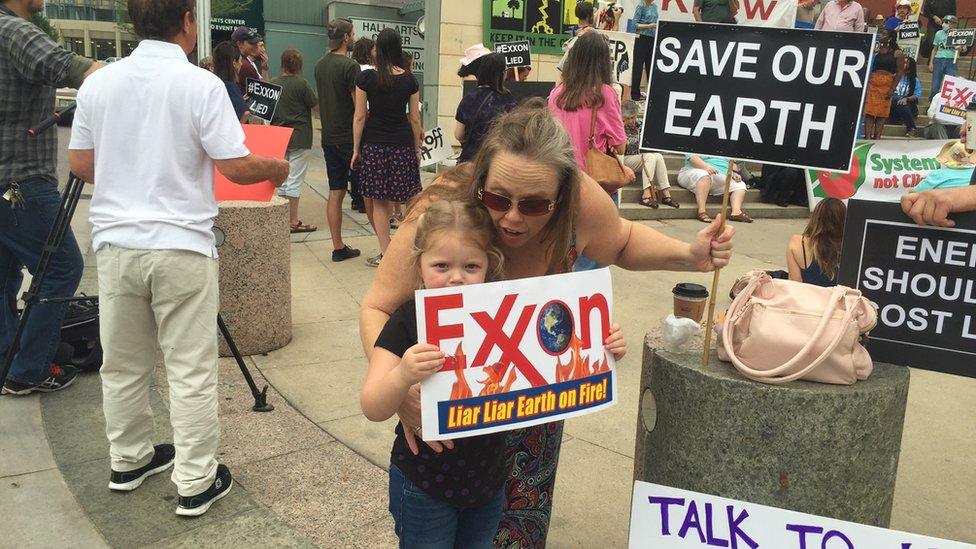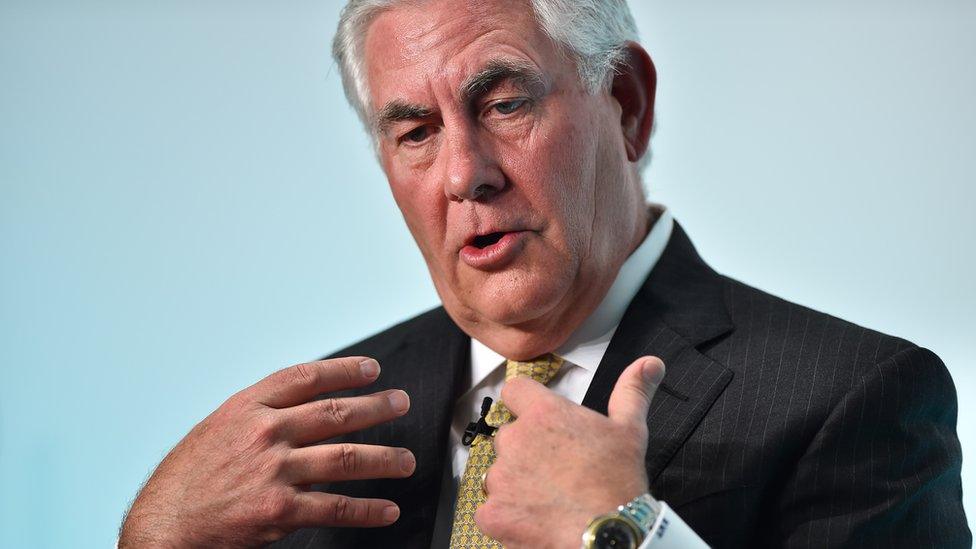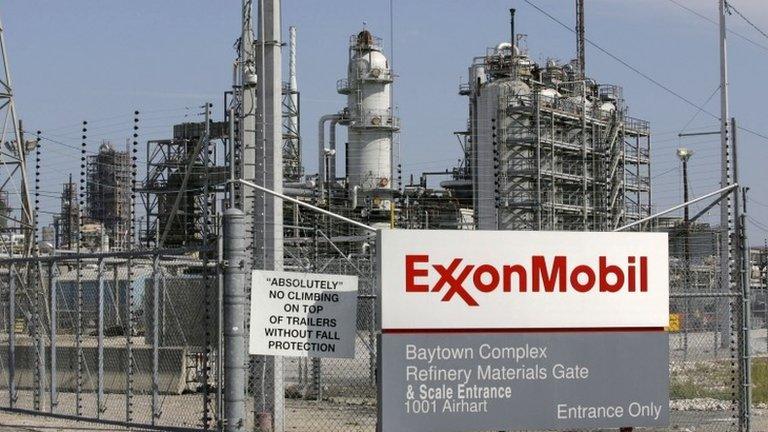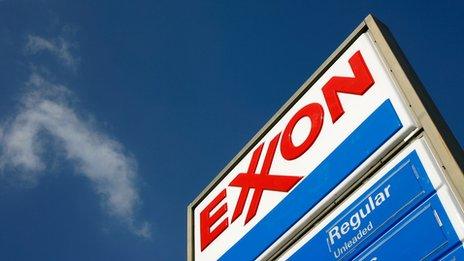Exxon: An inconvenient truth
- Published

An ice sculpture suggests Exxon knew about the science of climate change but failed to act
In the hot and humid conditions of downtown Dallas, the #Exxonknew ice sculpture - erected by environmental campaigners to suggest the company had known about the science of climate change but had failed to act - did not last too long.
And the activists were hoping the same thing would happen to Exxon, a company that has fended off efforts to make it toe the line on climate change for a quarter of a century.
The global giant has taken some hefty blows over the past 12 months.
It is struggling to sell oil and gas in a flooded market, profits are the lowest in 13 years, and the company has lost its vaunted AAA investment rating, for the first time since the great depression.
It is also facing investigations by a number of attorneys general.
Exxon and others, green groups say, will be shown to have misled investors and the public about the true state of climate science and will be fined, condemned and buried in the very ground from which it extracts its evil fuels.
With the fair winds from the Paris climate agreement at their back, climate-conscious shareholders took aim.
But, while the shareholders of BP, Shell, Statoil and others overwhelmingly backed motions to measure their exposure to carbon restrictions, at Exxon this was opposed by over 60% of investors.
And almost all other straightforward attempts to tackle the climate question were blown out of the water.
Yes, they did pass a resolution that would allow small shareholders to nominate climate-friendly people as board members, but they would still have to be accepted by a majority of investors.
Grey army
Exxon Mobil shareholders are cut from a different cloth.
In the Myereson Symphony Centre, in downtown Dallas, they gathered, older, greyer, angrier.
Chairman and chief executive, king and emperor, Rex Tillerson articulated their feelings on all things climate change.
Over the course of the two-hour meeting, he was interrupted by applause on only two occasions.

Protestors young and old were making their feeling heard at the Exxon Mobil annual general meeting in Texas
The first came after a contributor from the floor said the planet had cooled over the past century and we needed more global warming not less.
"If you don't like Exxon, why don't you go ahead and sell it and buy some solar stock?" the speaker from the floor asked, adding: "But whether you'll then have enough money to pay for the jet fuel that you used to come to visit here..."
There was no whooping and hollering, but plenty of applause.
Exxon says it has incorporated a price for carbon in all its internal workings since 2007.

Rex Tillerson accepts the consequences of climate change could be severe
It supports the idea of a revenue neutral carbon tax.
And Mr Tillerson accepts climate change is real and spoke of "catastrophic" consequences if it were left unchecked.
So why did the shareholders baulk at these essentially mild climate-change resolutions that Exxon could easily incorporate into its current business models?
I think years of being the global bad boy on global warming have taken their toll.
It has been painted as the uncaring exploiter, sneaky oil seller that has dodged and denied on climate change to suit its pockets.
And whether these things are true or not, Exxon has not been able to soften its image in a way others have done.
Its slogan could well be: "No-one likes us, but we don't care."
This same sensitivity, insecurity even, was manifest in its interactions with the press.
Journalists could not record images from the TV screens on which the AGM was relayed to a media room. We were accompanied everywhere by minders.
We were free to enter the meeting itself, but could use only pen and paper to record our impressions.

Key Facts
Exxon can trace its origins back to 1870, when John D Rockefeller created the Standard Oil Company
Exxon and Mobil merged in 1999 in a deal valued at about $80bn
The combined value of the company in 2015 was $353bn, making it the world's most valuable, publicly traded oil company
The company has about 75,000 employees around the world
The oil spill from the Exxon Valdez tanker in Alaska in 1989 was the biggest offshore in US history until Deepwater Horizon in 2010
In 2016, the Rockefeller Foundation said it would eliminate its holdings in Exxon, saying the company had misled the public over climate change

The broadcast of the meeting was also unusual, to say the least.
All we saw for two hours was the face of Mr Tillerson, no shots of the audience at all, not even when he was being asked questions.
The second and last burst of applause in the meeting came on the question of freedom of speech.
This is a very big issue for Exxon Mobil as the shareholders believe current investigations into the alleged undermining of climate science are an assault on their First-Amendment rights.
"The fact that people have different opinions on climate change; they have every right to their opinion, whether we agree with it or not - I will support their right to say so," said Mr Tillerson to a hefty ovation.
It is a little ironic, then, that he did not want to extend that same right to all of the press, as the Guardian newspaper was told it was not welcome at the shareholder meeting.
The more under the cosh Exxon feels, the less likely it is to embrace the ideas of outsiders, however mild.
If its shareholders are really ready to take the steps many want on climate change or indeed anything else, green groups will need to find another means.
They will not be told.
Follow Matt on Twitter @mattmcgrathbbc, external and on Facebook.
- Published25 May 2016

- Published24 May 2016
